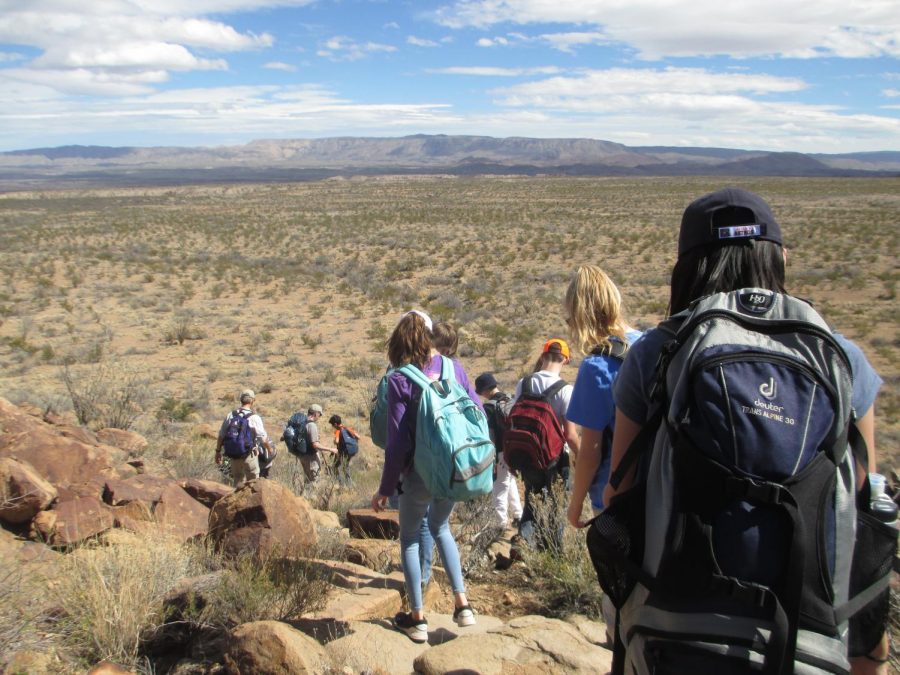Government shutdown jeopardizes Big Bend trip
Due to the government shutdown, which began on Dec. 22, there are currently no visitor services provided in Big Bend National Park, which would impede the annual eighth grade retreat. Above, last year’s eighth graders navigate down a trail in the park.
Additional reporting by Ashley Yen
As the partial government shutdown finishes day 29 with no end in sight, the eighth grade Big Bend trip is threatened by Congressional inaction. For the first time in 41 years, students may not have the opportunity to camp for a week in Texas’ best-known national park.
Although individuals can still visit Big Bend, students stay at the group campsite in Rio Grande Village, which is regulated by the federal government. Many of the services provided by the U.S. Department of the Interior, which includes the National Park Service, are closed due to the shutdown. As a result, Big Bend is experiencing a reduction in the number of park rangers and janitorial services, making it impossible to bring such a large group of students for a week.
“I was skeptical at first when I heard we might not go to Big Bend because it seems improbable that the government shutdown would last that long,” eighth grader Emily Huang said. “However, I realized later that there still needs to be time for the clean-up of the park from the absence of rangers.”
The shutdown began on Dec. 22 when President Trump and Republicans clashed with Congress over funding the border wall. Under the Constitution, Congress must periodically pass bills to fund the federal government. As Congress was creating this year’s appropriations bill, Trump demanded $5.6 billion to build a wall along the Southern border. The Democrats in Congress refused to set aside money for a wall, and Trump refused to pass any appropriations bill that did not fund the wall, leaving the government in limbo.
Around 800,000 government employees have been furloughed. The newly Democratic-controlled House has passed two bills to fund the government, but the Senate, led by Senate Majority Leader Mitch McConnell, has blocked both bills. Should Republicans pass such a bill, the government will reopen and the thousands of federal workers who are on furlough will begin working again.
Despite the possibility of cancellation, dozens of teachers, coaches, staff and administrators are preparing for the trip as planned. However, if the government does not reopen before Feb. 23, the students will not visit Big Bend this year. Right now, there is no “Plan B.”
“I’m really [excited] for Big Bend since it sounds really fun to spend time camping and hiking with my friends, and I would be extremely disappointed if it got cancelled,” Huang said. “Big Bend is a big part of the middle school experience, and it would be really [sad] if our grade alone had to miss out on it.”
Director of Experiential Education Marty Thompson, who is in charge of planning the Big Bend trip, is concerned about the shutdown’s effect on the students’ experience.
“I encourage parents and families to reach out to their elected representatives,” he said. “As private citizen Marty Thompson, I reached out to my [elected representatives] to let them know [the shutdown’s] impact on this St. John’s tradition.”
Middle School students are not the only ones who would be affected by the cancellation of the Big Bend trip. Sixteen seniors will serve as counselors, including Jonah Pesikoff, who said that going to Big Bend four years ago was a highlight of his time at SJS.
Pesikoff jumped at the chance to apply for the counselor position. When he was accepted, he dropped out of the spring musical to instead spend a week outdoors with the younger students.
“Big Bend felt like the last hurrah of Middle School,” Pesikoff said. “It will be really sad if we can’t go because students will miss out on the chance to meet Upper Schoolers and be in nature.”
Thompson agrees that if the shutdown persists, students will not have a unique opportunity to connects with other classes.
“Part of what makes St. John’s special is the shared experiences we have, and I would hate for the Class of 2023 to have to look back and say, ‘We missed out on that.'”

Sophie is a senior, and this is her fourth year on The Review. She is beauty. She is grace. She likes eating brownie batter, too.

Celine is a senior in her fourth year on The Review. Her favorite animal is a wolf, and she loves having philosophical discussions and overthinking everything.














